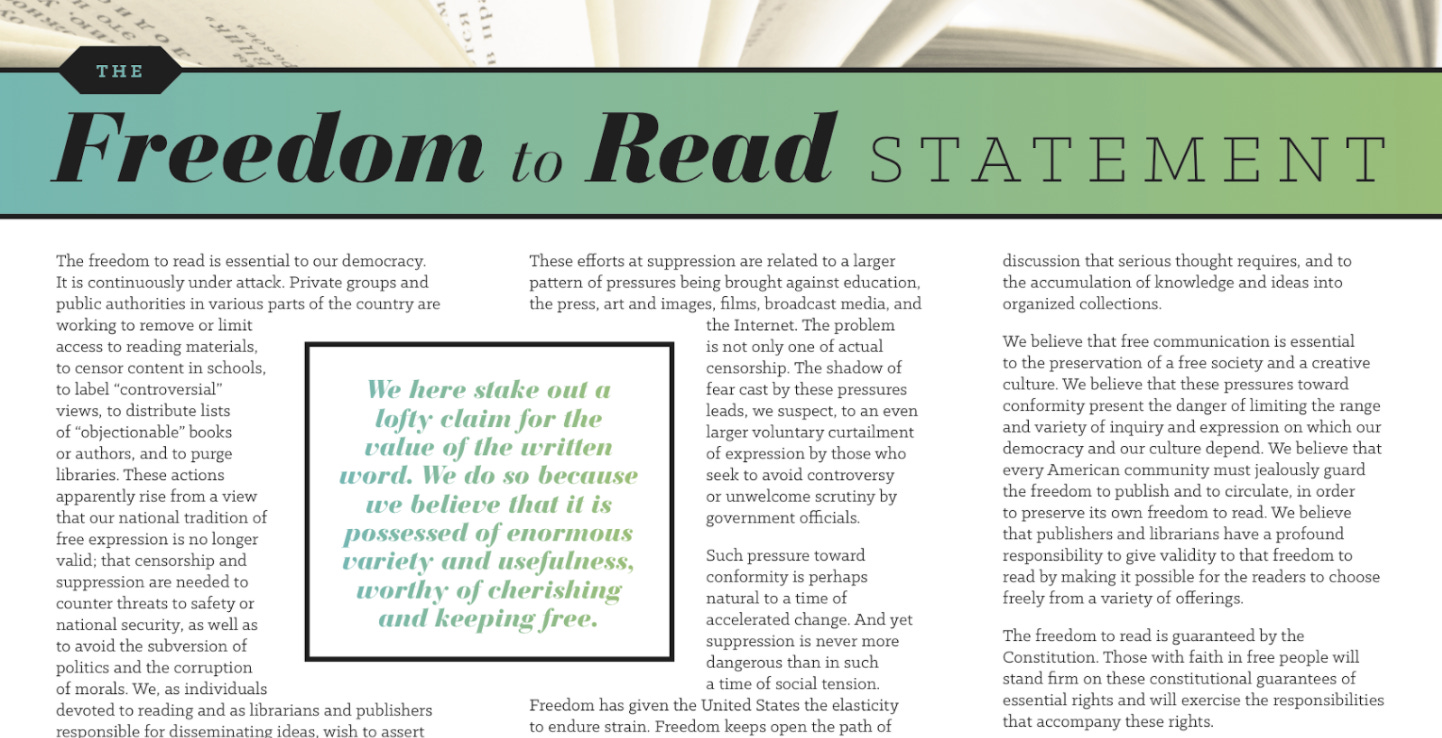American Library Association 1953: The Freedom to Read
"It is not in the public interest to force a reader to accept the prejudgment of a label characterizing any expression or its author as subversive or dangerous."
In 1953, leaders of the American Library Association (ALA) met at the Westchester Country Club in Rye, New York to push back against a “national trend toward the restriction of the free trade in ideas” as described by William S. Dix, chair of the ALA’s Intellectual Freedom Committee (IFC). Out of this meeting came “The Freedom to Read”, a statement that would be issued by the ALA and presented at the American Book Publishers Council in June of that year. The statement was approved “overwhelmingly by a shouting and enthusiastic vote” according to historian Christopher M. Finan.
This statement was also endorsed by The New York Times, Washington Post, American Booksellers Association, American Newspaper Guild, and the American Bar Association, among many other organizations. The context provided at the beginning of the statement sounds eerily familiar to many of today’s culture war battles. Contrast this statement with what the American Booksellers Association recently said about books being violent.
Here are some key excerpts of the full statement:
The Freedom to Read Statement
The freedom to read is essential to our democracy. It is continuously under attack. Private groups and public authorities in various parts of the country are working to remove or limit access to reading materials, to censor content in schools, to label "controversial" views, to distribute lists of "objectionable" books or authors, and to purge libraries. These actions apparently rise from a view that our national tradition of free expression is no longer valid; that censorship and suppression are needed to counter threats to safety or national security, as well as to avoid the subversion of politics and the corruption of morals. We, as individuals devoted to reading and as librarians and publishers responsible for disseminating ideas, wish to assert the public interest in the preservation of the freedom to read.
Most attempts at suppression rest on a denial of the fundamental premise of democracy: that the ordinary individual, by exercising critical judgment, will select the good and reject the bad. We trust Americans to recognize propaganda and misinformation, and to make their own decisions about what they read and believe. We do not believe they are prepared to sacrifice their heritage of a free press in order to be "protected" against what others think may be bad for them. We believe they still favor free enterprise in ideas and expression.
These efforts at suppression are related to a larger pattern of pressures being brought against education, the press, art and images, films, broadcast media, and the Internet. The problem is not only one of actual censorship. The shadow of fear cast by these pressures leads, we suspect, to an even larger voluntary curtailment of expression by those who seek to avoid controversy or unwelcome scrutiny by government officials.
Such pressure toward conformity is perhaps natural to a time of accelerated change. And yet suppression is never more dangerous than in such a time of social tension. Freedom has given the United States the elasticity to endure strain. Freedom keeps open the path of novel and creative solutions, and enables change to come by choice. Every silencing of a heresy, every enforcement of an orthodoxy, diminishes the toughness and resilience of our society and leaves it the less able to deal with controversy and difference.
[ . . . ]
We believe that free communication is essential to the preservation of a free society and a creative culture. We believe that these pressures toward conformity present the danger of limiting the range and variety of inquiry and expression on which our democracy and our culture depend.
[ . . . ]
It is in the public interest for publishers and librarians to make available the widest diversity of views and expressions, including those that are unorthodox, unpopular, or considered dangerous by the majority.
Creative thought is by definition new, and what is new is different. The bearer of every new thought is a rebel until that idea is refined and tested. Totalitarian systems attempt to maintain themselves in power by the ruthless suppression of any concept that challenges the established orthodoxy. The power of a democratic system to adapt to change is vastly strengthened by the freedom of its citizens to choose widely from among conflicting opinions offered freely to them. To stifle every nonconformist idea at birth would mark the end of the democratic process. Furthermore, only through the constant activity of weighing and selecting can the democratic mind attain the strength demanded by times like these. We need to know not only what we believe but why we believe it.
[ . . . ]
It is not in the public interest to force a reader to accept the prejudgment of a label characterizing any expression or its author as subversive or dangerous.
The ideal of labeling presupposes the existence of individuals or groups with wisdom to determine by authority what is good or bad for others. It presupposes that individuals must be directed in making up their minds about the ideas they examine. But Americans do not need others to do their thinking for them.
Read the full statement here.



